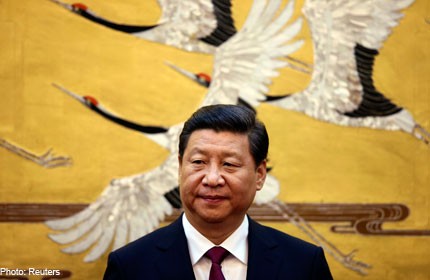Xi wants to speed up cross-strait talks

Chinese President Xi Jinping has signalled he wants to move faster on the issue of political talks with Taiwan, a goal unlikely to be met soon due to resistance from the island's people and the low popularity of Taiwan President Ma Ying-jeou, analysts said.
"The longstanding cross-strait political differences must ultimately be resolved gradually. We can't pass this problem from one generation to the next," Mr Xi was quoted as telling former Taiwan Vice-President Vincent Siew on Sunday during closed-door talks held on the sidelines of the Apec summit in Bali.
"We've indicated many times that we're willing to make the necessary arrangements in order to negotiate cross-strait political problems on an equal footing with Taiwan under the one-China framework," he said.
"Relevant officials on both sides can also meet face-to-face to discuss how to handle issues pertinent to cross-strait ties."
Their talks were followed by an unprecedented meeting between Mr Zhang Zhijun, director of China's Cabinet-level Taiwan Affairs Office (TAO), and Mr Wang Yu-chi, head of Taiwan's Mainland Affairs Council (MAC).
They addressed each other by their official title of "minister" and talked about exchanging visits while surrounded by journalists at the Hotel Laguna lobby.
The Zhang-Wang meeting would have been inconceivable in the past, given China's claim of sovereignty over Taiwan and the Chinese Communist Party's insistence that it is the sole legitimate government of China.
Negotiations between the two sides, which split at the end of a civil war in 1949, have been handled by quasi-official organisations since contact resumed in the late 1980s.
Ties have flourished after Mr Ma came to power in 2008, but these have thus far been confined to economic and cultural exchanges.
Analysts say that Mr Xi, who has been in power for nearly a year, is shifting his focus to Taiwan now that he has dealt with other priorities such as fighting corruption and implementing economic reforms.
Having served 22 years in coastal provinces with large Taiwanese business communities, Mr Xi knows the island well and feels more urgency to break the political impasse and produce concrete results, such as concluding a peace treaty and implementing military "confidence-building mechanisms".
One tangible outcome would be a historic meeting between Mr Xi and Mr Ma, possibly at next year's Apec summit that China is hosting, Professor Chu Jingtao of the Chinese Academy of Social Sciences told The Straits Times.
A visit by Mr Zhang to Taiwan in the coming months may increase the chances of such a meeting taking place, he added.
However, Taiwanese scholars say it would be "suicidal" for Mr Ma to push for political dialogue with China.
The President is battling single-digit approval ratings over poor economic performance and internal strife in the ruling Kuomintang party.
"Xi may want to move things forward, but the constraint is all on Ma," said Prof Lin.
Dr Tung Chen-yuan of National Chengchi University pointed out that no one from Mr Ma's inner circle of advisers is taking part in the inaugural two-day Cross-strait Peace Forum, which begun in Shanghai.
The Beijing-endorsed event brings together scholars and retired government officials who are due to focus on the subject of cross-strait political dialogue.
"The Ma administration is not willing to engage even at the non-official level," said Dr Tung.
Both scholars say the breakthrough may not come during Mr Ma's remaining two years in office.
Mr Xi is also unlikely to want to put too much pressure on Taiwan and risk turning off its people.
"I expect there will be sporadic contact between MAC and TAO in order to tackle ad hoc, urgent issues. As for regular meetings, I don't think so," Dr Tung said.
seokhwai@sph.com.sg
kianbeng@sph.com.sg

Get a copy of The Straits Times or go to straitstimes.com for more stories.